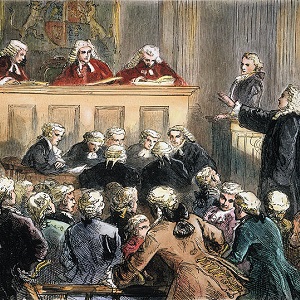in The Origins and Development of American Legal History in New York City (1609-1865)
Lesson 2
Created by Dr. Aaron Welt,
Judith S. Kaye Teaching Fellow
NYS Common Core Grades 11 & 12:
United States History and Government
Participation in Government and Civics
This series of five lesson plans is designed to familiarize upper-level high school and college students with the early history of American law, with a specific focus on New York City. These lesson plans utilize online resources provided by the Historical Society of the New York Courts and aim to introduce students to the major events and turning points that help us understand how American law, courts, and the criminal justice system developed in early US history. The lesson plans are divided chronologically and thematically, but are meant to be instructed in conversation with one another. For each of the outlined class activities, students should write down their answers to submit to the instructor.
This lesson plan meets the following guidelines of New York State’s Common Core Social Studies Framework (2017):
The Historical Society’s website contains a wealth of related resources, including descriptions of cases and biographies of judges who decided the cases.
Alexander Hamilton
Lawyer
Called for prosecution of Frothingham
Josiah Hoffman
New York Attorney General
Counsel for prosecution
Brockholst Livingston
Lawyer and future judge
Counsel for defense
Hon. Jacob Radcliff
New York Supreme Court of Judicature Justice
Presided over the case
People v. Croswell
3 Johns. Cas. 337 (N.Y. 1804)
Ambrose Spencer
New York Attorney General
Counsel for prosecution
Hon. Morgan Lewis
Chief Justice of the New York Supreme Court of Judicature
Alexander Hamilton
Lawyer
Counsel for defense on a writ of certiorari
People v. Croswell: Alexander Hamilton and the Transformation of the Common Law of Libel
Judicial Notice Article
Image Citation: John Peter Zenger /N(1697-1746). American Printer And Journalist. Andrew Hamilton Defending Zenger At His Trial For Seditious Libel In New York In 1735. Wood Engraving, 19Th Century.
New Amsterdam, New York, and Colonial Law in the New World
|
Crime and Criminal Justice in Antebellum New York City
|
|---|

